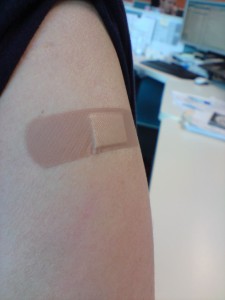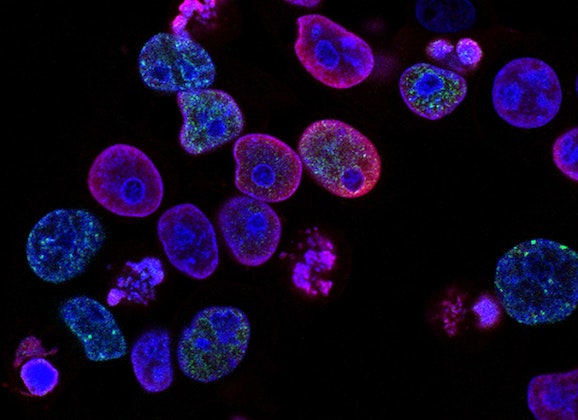Vaccines. Just do it.
After watching a recorded debate regarding vaccines between Republican Presidential Nominees Dr. Ben Carson and Donald Trump, I thought that I would write my own blog post about how these things actually work on protecting us from disease and answer a few basic questions about them.
If you think about it: how many people get chicken pox a second time? The number is very small, because after we are exposed to the herpes zoster virus, get the chicken pox, and ultimately recover, our immune system is able to recognize the virus almost immediately and destroy it, which prevents us from catching it a second time. A vaccine works the same way by helping our immune system recognize bacteria, viruses, and toxins that make us sick.
What is a vaccine?

photo credit: Panvax H1N1 Vaccine (license)
A vaccine is a simple biological cocktail that helps you acquire immunity to a disease before actually being exposed to it by priming your immune system and taking advantage of its ability to recognize pathogens that it’s been exposed to in the past.
Typically, a vaccine will consist of a weakened form of the bacteria/virus that makes you sick. In some cases, you won’t have the bacteria/virus in the vaccine at all, just an inactivated toxin or protein. The use of a weakened strain or toxin/protein prevents you from getting too sick when you receive the vaccine, but still allows your immune system to recognize the pathogen and make a response against it. That way, if you’re exposed to a fully active form of the pathogen, you can make a response right away.
Frequently asked questions
There are a few common questions that surround vaccines. Here are a few that I’ve heard come up in the media:
- Are vaccines safe?
- Yes. They have been used for decades to combat and nearly eradicate deadly diseases that once had a devastating impact on the world, such as polio and smallpox. If they were not safe, we would have detected it many, many years ago.
- Why are there many other chemicals in vaccines other than the bacteria/virus/protein?
- Other chemicals are needed to help make the vaccine as effective as possible. Some examples of the chemicals added to vaccines are: preservatives, adjuvants, antibiotics, and stabilizers.
- Preservatives are used for a wide variety of things in vaccines, including: inactivating proteins (a form of vaccination) and preventing microorganisms from contaminating the vaccine.
- Adjuvants are used to help your immune system make an optimal response against the bacteria/virus/protein you’re being vaccinated against. This ensures that you become protected.
- Antibiotics are used to prevent other bacteria from growing inside the vaccine and disrupting the immune response you’re supposed to make.
- Stabilizers are critical for allowing the vaccine to still be viable from the time it’s made until it’s administered, in case it is subjected to any stresses such as temperature change. If a vaccine becomes unstable, it can be rendered useless.
- Other chemicals are needed to help make the vaccine as effective as possible. Some examples of the chemicals added to vaccines are: preservatives, adjuvants, antibiotics, and stabilizers.
- Do vaccines cause autism?
- NO. This myth has been debunked numerous times by organizations such as the Centers for Disease Control and Prevention (CDC), who studied multiple vaccines and found no correlation between vaccines and autism spectrum disorder. In fact, this myth originated from a study conducted by Dr. Andrew Wakefield, who altered patient medical histories and falsified the data that was used for the study published in the BMJ (British Medical Journal). His study has since been retracted due to its false claims.
Vaccines have saved countless lives since their invention, and will continue to do so. The scary reality is that some people continue to not vaccinate, which puts themselves and many others at risk for a disease that can be easily prevented. An example of this is the measles outbreak that recently occurred in Disneyland: although there were no fatal cases, many of those who got sick were people who were not vaccinated against measles.
Vaccines. Just do it, man.




